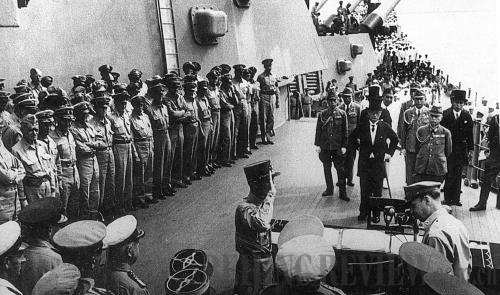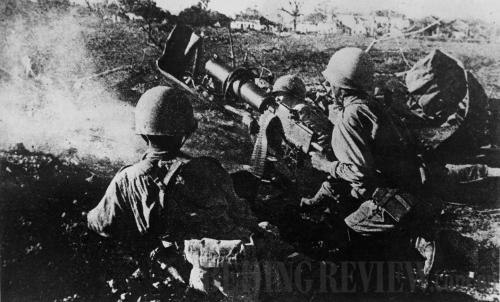|
 |
|
The ceremony for Japan's formal surrender to the Allies takes place on board the U.S.S. Missouri in Tokyo Bay on September 2, 1945 (XINHUA) |
On September 3, 1945, people around the nation of China poured onto the streets to celebrate, and with good reason. The day before, Japan had signed its formal surrender to the Allies, including China, on board the U.S.S. Missouri in Tokyo Bay, finally bringing to an end what had been a harrowing non-stop war.
According to experts, foreign and domestic, the Chinese People's War of Resistance Against Japanese Aggression played an important role in World War II (WWII). Though the war of resistance lasted eight years, it had its roots in events taking place six years prior. In his book Forgotten Ally: China's World War II, 1937-1945, Rana Mitter, a professor of history at Oxford University, said that the marathon struggle that China waged was not just for its own dignity and survival, but for the good of all the Allies.
On July 14 this year, China released the official record of its loss of life and property in the war, another move designed to stress the country's important contribution toward preserving peace. According to the data, China suffered over 35 million casualties during the war, with military casualties reaching more than 3.8 million.
 |
|
Soldiers of the China Expeditionary Force fire upon Japanese forces during a battle in Myitkyina, Burma (XINHUA) |
Great contributions
"With these sacrifices, the country held back most of Japan's troops while coordinating with the Allies' operations in the West," said Wang Jianliang, Director of the Institute of Modern History at the Chinese Academy of Social Sciences.
The data show that the Japanese army deployed 1.86 million troops in China, accounting for more than 50 percent of the total of 3.58 million Japanese combatants sent overseas. Chinese forces killed, wounded and captured more than 1.5 million Japanese soldiers from 1931-45, accounting for 70 percent of casualties suffered by Japanese forces.
Hu Dekun, a historian with Wuhan University in central China's Hubei Province, said that by drawing a large number of Japanese military resources to their land, the Chinese resistance thwarted Japan's wartime strategy. According to him, as Japan had to gradually commit more troops to China, 32 of the 34 divisions of the Japanese army—comprising 94 percent of its entire forces—as well as some navy forces had found their way to the China battlefield by 1938.
As the war continued, the regular army and militia led by the Communist Party of China (CPC) grew to surpass 3.1 million people and became the main force to finally turn the tables in 1945. "In particular the guerrilla bases led by the CPC behind the frontlines disrupted the Japanese army's operations," Hu said. According to him, by mobilizing the public behind enemy lines, the CPC-led army and civilian groups killed a total of 1.7 million Japanese and puppet regime troops during the war.
Wang agreed that China's perseverance greatly impeded the progress of the Japanese aggressors, forcing them to give up their northward invasion targeting the Soviet Union and retarding their southward invasion which aimed for U.S. and British bases in Southeast Asia. Because of this, the Soviet Union did not have to fight enemies on both eastern and western fronts, and the Allied powers like the United States and Britain also gained more time to execute their strategies.
Weighed down by China's resistance, Japan had to say no to Germany's request for reinforcement in the Battle of Stalingrad with the Soviet Union in 1942, freeing the Soviet Union from the worry of being outflanked. According to Wang, China helped stall and resist some 80 percent of the total Japanese army forces. He claimed that even after the Pacific War broke out in December 1941, China remained the main Far East battlefield in WWII.
In 1942, the Japanese navy mapped out a scheme to invade Australia so as to prevent the United States from using the country as a base to launch counterattacks, but with its forces preoccupied in China, the Japanese army rejected the plan. According to Hu, Japanese troops in China still far outnumbered those in the Pacific battlefield by the end of the Pacific War.
As part of the Allies' plan, Chinese troops also did battle in Myanmar, then known as Burma, between 1943 and 1945 and liberated the country's north as well as the border area of southwest China's Yunnan Province after suffering severe casualties. The road linking Yunnan and Burma secured by Chinese troops would later greatly facilitate the Allies' counterattacks in Burma.
China also provided airfields from which Allied air forces could launch raids on Japanese targets. Some U.S. bombers running low on fuel also landed in China, like those involved in James Doolittle's famous 1942 raid on Tokyo.
According to Hu, China's wartime diplomacy also played a vital role in WWII. "By bringing together the Soviet Union, the United States and Britain, China was able to emerge victorious from the war," Hu said.
The role that China played in WWII made it one of the "four major powers," together with the Soviet Union, the United States and Britain, granting China a permanent seat on the United Nations Security Council.
| 